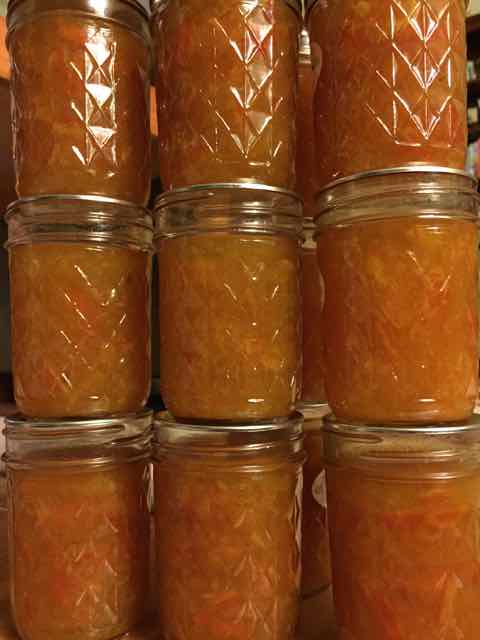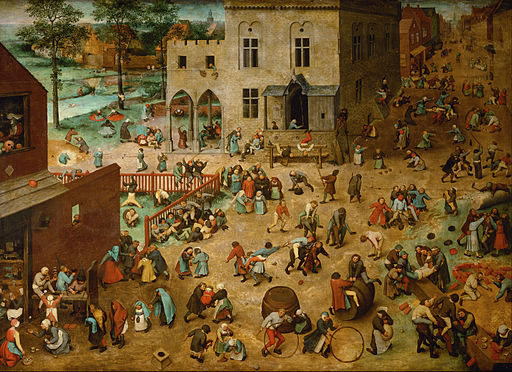\ˈmär-mə-ˌlād\
| M was one of the first friends my parents made after they moved to Los Angeles in the early 1960s. The story I always heard was that shortly after my parents had moved into their rented house my father was walking down the block and heard someone in a nearby house playing the piano. The piece was something Russian and complicated, and whoever was playing played very very well indeed—so much so that my dad made a point of introducing himself to the next adult he saw emerging from the house, on the assumption that anyone who could play like that was someone worth knowing. |
When my mother stopped by M’s house for afternoon tea, I did not complain about having to tag along. I would not be entertained or made much of: M was not especially interested in children. But there was a jigsaw puzzle of a Pieter Bruegel painting in the coffee table drawer and I would sit on the rug and piece it together—kids in the town square rolling hoops and walking on stilts and pulling each other’s hair. Every now and then the grownup chat would break through my absorption: something about Sanskrit, or real estate, or a tale of someone’s outrage or ineptitude, which M would recount with gleeful animation, gesturing with her cigarette.
Her house was small and cluttered, full of framed pictures, objets de vertu and piles of miscellaneous stuff. Whenever I visited her in later years she was perpetually “cleaning things out” and would press some item upon me: a high modern table lamp, a pamphlet about a German naturist child-rearing technique, a beaded vase. She would urge me to take some of the endless stacks of CDs spilling off her shelves, while warning that some of them were “trash”—and then watch in attentively eloquent silence as I self-consciously made my picks. For all her shedding of objects the house never seemed to get any less crowded; going inside was like visiting the carapace of a decorator crab, growing ever more encrusted with shells and shiny rocks.
And there was the marmalade. M’s back yard overflowed with citrus, including a large and thriving Rangpur lime tree. Rangpur limes are not technically limes – they are, as best I can tell, mandarins crossed with lemons. The fruit is fragrant and very sour. For years M used them to make marmalade, which my parents coveted and which I found utterly horrible.
Marmalade, after all, is a very adult jam. While now we know it as a conserve made from citrus fruits boiled with sugar, originally it was a paste or jelly made from quinces and flavored with rosewater and musk or ambergris. The resulting mass was then cut into squares and eaten, the medieval equivalent of gummy bears (though funkier-smelling and much more expensive). The word comes from the Portuguese word for the quince fruit: marmelo. Marmelo is itself a blend of the classical Latin mēlomeli (honey flavored with quinces) and melimēla (a variety of apple). It’s related to the ancient Greek words for apple (μῆλον ) and honey (μέλι): something astringent, and something sweet.
In later years I developed a grownup’s taste for bitter flavors and discovered that I rather liked M’s lime marmalade. As this fortunately coincided with M’s decision that she was no longer really interested in climbing ladders or hoiking around vats of boiling jelly, I became a custodian of her recipe.
And after that, every time I visited her in the winter I came away, willy nilly, with bags of fresh limes. Sometimes I protested—I was traveling on the train and couldn’t carry a 20 lb sack of fruit; I was about to leave for a trip and didn’t have time to deal with them—all in vain. The limes were inexorable (and on at least one occasion when I did not get to LA during the proper season M prevailed on my mother to mail me a box, California Ag Department rules against shipping citrus across county lines be damned).
The last time I saw M, we had dinner out and I drove her home. After many years with a second-rate piano, she had just inherited a Steinway, which she showed off with unrestrained delight, patting the keys and naming them by the colors the notes made in her head: maroon, shiny black, purple, matte black, crimson. She played Chopin for me and told me that while most people with perfect pitch find the notes go a little bit sharp in their old age, she (ever unconventional) was going flat. This pleased her a great deal. Before I left, she pressed a frying pan and a flowered nightgown into my hands and reminded me that I must come back in January for the year’s lime consignment.
She fell ill two weeks later and died after a brief and endless struggle.
At a memorial service a couple of weeks ago, M’s tiny house was swept eerily clean, windows thrown wide, wooden floors visible for the first time in my memory. The lime tree out back was bursting with fruit, all perfectly ripe and fragrant and sour. “Take all you want,” M’s daughter told us, “Take more!” So we picked and picked, filling every bag we could scrounge. And since then I’ve been in my kitchen almost every evening, slicing and stirring and processing. I’ve made nearly 6 dozen jars so far, yet the pile of limes doesn’t seem to be getting any smaller. We are racing to freeze the rest, keeping a precarious step ahead of the fruit flies and the mold.
Six dozen jars so far -- then ten dozen, a dozen dozen? More? We are utterly marmaladen, but this will be the last batch from that fabulous tree. I can hear M in my head: “It was a good year, kiddo. Take a few more.”




 RSS Feed
RSS Feed